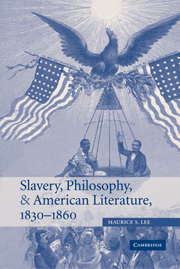Book contents
- Frontmatter
- Contents
- Acknowledgments
- Introduction
- 1 Absolute Poe
- 2 “Lord, it's so hard to be good”: affect and agency in Stowe
- 3 Taking care of the philosophy: Douglass's commonsense
- 4 Melville and the state of war
- 5 Toward a transcendental politics: Emerson's second thoughts
- Epilogue: An unfinished and not unhappy ending
- Index
1 - Absolute Poe
Published online by Cambridge University Press: 22 September 2009
- Frontmatter
- Contents
- Acknowledgments
- Introduction
- 1 Absolute Poe
- 2 “Lord, it's so hard to be good”: affect and agency in Stowe
- 3 Taking care of the philosophy: Douglass's commonsense
- 4 Melville and the state of war
- 5 Toward a transcendental politics: Emerson's second thoughts
- Epilogue: An unfinished and not unhappy ending
- Index
Summary
Dim memories, dead lovers, old sins, former selves – almost nothing passes utterly away in Poe. Nor does faith in rational systems finally expire in his writings, for although Poe is preternaturally sensitive to the limits of enlightenment philosophy, and although he appears to anticipate postmodernism as uncannily as anyone in the nineteenth century, he remains like so many of his desperate characters driven by the crises of his moment. Melville, Emerson, Douglass, and Stowe have for decades been associated with political questions. Now somewhat belatedly but with sudden intensity a historically grounded and culturally embedded Poe is being unearthed. Whereas deconstruction and psycholinguistics used Poe in a decidedly ahistorical manner, recent scholarship sets his work within social, economic, and mass cultural contexts of the antebellum period. The problem is that Poe is becoming something of a divided figure bound by his era's political discourse but divorced from the philosophy of his day. It may be possible, however, to synthesize this instance of double consciousness by finding a more stubbornly historical Poe who not only participates in his era's broader cultural milieus but who uses historically available ideas to theorize his American world. Like Emerson, Melville, Douglass, and Stowe, Poe tries to bring philosophical order to the slavery conflict. Unlike them, the order he comes to announce is pro-slavery and virulently racist, indicating one possible use of transcendentalism in the antebellum United States.
- Type
- Chapter
- Information
- Slavery, Philosophy, and American Literature, 1830–1860 , pp. 14 - 51Publisher: Cambridge University PressPrint publication year: 2005

